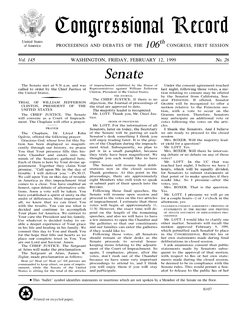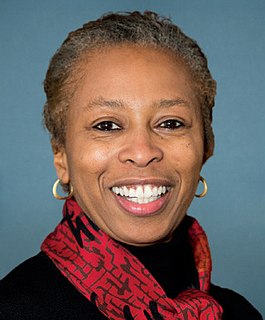Related Research Articles

Article One of the United States Constitution establishes the legislative branch of the federal government, the United States Congress. Under Article One, Congress is a bicameral legislature consisting of the House of Representatives and the Senate. Article One grants Congress various enumerated powers and the ability to pass laws "necessary and proper" to carry out those powers. Article One also establishes the procedures for passing a bill and places various limits on the powers of Congress and the states from abusing their powers.

The United States Congress or U.S. Congress is the bicameral legislature of the federal government of the United States and consists of the House of Representatives and the Senate. The Congress meets in the United States Capitol in Washington, D.C. Both senators and representatives are chosen through direct election, though vacancies in the Senate may be filled by a governor's appointment. Congress has 535 voting members: 100 senators and 435 representatives, the latter defined by the Reapportionment Act of 1929. In addition, the House of Representatives has six non-voting members, bringing the total membership of the US Congress to 541 or fewer in the case of vacancies.

Parliamentary procedure is the body of ethics, rules, and customs governing meetings and other operations of clubs, organizations, legislative bodies and other deliberative assemblies.

A veto is the power to unilaterally stop an official action, especially the enactment of legislation. A veto can be absolute, as for instance in the United Nations Security Council, whose permanent members can block any resolution, or it can be limited, as in the legislative process of the United States, where a two-thirds vote in both the House and Senate will override a presidential veto of legislation. A veto may give power only to stop changes, like the US legislative veto, or to also adopt them, like the legislative veto of the Indian President, which allows him to propose amendments to bills returned to Parliament for reconsideration.
Contempt of Congress is the act of obstructing the work of the United States Congress or one of its committees. Historically, the bribery of a U.S. Senator or U.S. Representative was considered contempt of Congress. In modern times, contempt of Congress has generally applied to the refusal to comply with a subpoena issued by a Congressional committee or subcommittee—usually seeking to compel either testimony or the production of requested documents.

The Congressional Record is the official record of the proceedings and debates of the United States Congress, published by the United States Government Publishing Office and issued when Congress is in session. Indexes are issued approximately every two weeks. At the end of a session of Congress, the daily editions are compiled in bound volumes constituting the permanent edition. Chapter 9 of Title 44 of the United States Code authorizes publication of the Congressional Record.

Article IV, Section 1 of the United States Constitution, the Full Faith and Credit Clause, addresses the duties that states within the United States have to respect the "public acts, records, and judicial proceedings of every other state." According to the Supreme Court, there is a difference between the credit owed to laws as compared to the credit owed to judgments. Judgments are generally entitled to greater respect than laws, in other states. At present, it is widely agreed that this Clause of the Constitution has a minimal impact on a court's choice of law decision provided that no state’s sovereignty is infringed, although this Clause of the Constitution was once interpreted to have greater impact.
The nuclear option is a parliamentary procedure that allows the United States Senate to override a standing rule of the Senate, such as the 60-vote rule to close debate, by a simple majority of 51 votes, rather than the two-thirds supermajority normally required to amend the rules. The option is invoked when the majority leader raises a point of order that contravenes a standing rule, such as that only a simple majority is needed to close debate on certain matters. The presiding officer denies the point of order based on Senate rules, but the ruling of the chair is then appealed and overturned by majority vote, establishing new precedent.
In law, the legislative intent of the legislature in enacting legislation may sometimes be considered by the judiciary when interpreting the law. The judiciary may attempt to assess legislative intent where legislation is ambiguous, or does not appear to directly or adequately address a particular issue, or when there appears to have been a legislative drafting error.

Impeachment in the United States is the process by which a legislature brings charges against a civil officer of government for crimes alleged to have been committed, analogous to the bringing of an indictment by a grand jury. Impeachment may occur at the federal level or the state level. The federal House of Representatives can impeach federal officials, including the president, and each state's legislature can impeach state officials, including the governor, in accordance with their respective federal or state constitution.

The Clerk of the United States House of Representatives is an officer of the United States House of Representatives, whose primary duty is to act as the chief record-keeper for the House.
The United States Senate has the authority for meeting in closed session, as described in the Standing Rules of the Senate.
Congressional oversight is oversight by the United States Congress over the Executive Branch, including the numerous U.S. federal agencies. Congressional oversight includes the review, monitoring, and supervision of federal agencies, programs, activities, and policy implementation. Congress exercises this power largely through its congressional committee system. Oversight also occurs in a wide variety of congressional activities and contexts. These include authorization, appropriations, investigative, and legislative hearings by standing committees; which is specialized investigations by select committees; and reviews and studies by congressional support agencies and staff.

The Speech or Debate Clause is a clause in the United States Constitution. The clause states that members of both Houses of Congress
...shall in all Cases, except Treason, Felony and Breach of the Peace, be privileged from Arrest during their attendance at the Session of their Respective Houses, and in going to and from the same; and for any Speech or Debate in either House, they shall not be questioned in any other Place.
In the United States, term limits, also referred to as rotation in office, restrict the number of terms of office an officeholder may serve. At the federal level, the 22nd Amendment to the United States Constitution limits the president of the United States to two four-year terms. State government offices in some, but not all states, are term-limited, including for executive, legislative, and judicial office.
Gravel v. United States, 408 U.S. 606 (1972), was a case regarding the protections offered by the Speech or Debate Clause of the United States Constitution. In the case, the Supreme Court of the United States held that the privileges and immunities of the Constitution's Speech or Debate Clause enjoyed by members of Congress also extend to Congressional aides, but not to activity outside the legislative process.

The United States House of Representatives is the lower house of the United States Congress, with the Senate being the upper house. Together they compose the national bicameral legislature of the United States.
The United States Senate Journal is a written record of proceedings within the United States Senate in accordance with Article I, Section 5 of the U.S. Constitution.
Each House shall keep a journal of its proceedings, and from time to time publish the same, excepting such parts as may in their judgment require secrecy; and the yeas and nays of the members of either House, on any question, shall, at the desire of one-fifth of those present, be entered on the journal.

The United States Senate is the upper chamber of the United States Congress, which, along with the United States House of Representatives—the lower chamber—constitutes the legislature of the United States. The Senate chamber is located in the north wing of the Capitol Building in Washington, D.C.

The Chaplain of the United States House of Representatives is the officer of the United States House of Representatives responsible for beginning each day's proceedings with a prayer. The House cites the first half of Article 1, Section 2, Clause 5 in the United States Constitution as giving it the authority to elect a Chaplain, "The House of Representatives shall choose their speaker and other officers".
References
- 1 2 Hudiberg, Jane. "The House Journal: Origin, Purpose, and Approval" (PDF). Congressional Research Service.
- ↑ Handler, Nicholas (May 2019). "Rediscovering the Journal Clause: The Lost History of Legislative Constitutional Interpretation". University of Pennsylvania Journal of Constitutional Law. 21: 1219–1298.
| This United States government–related article is a stub. You can help Wikipedia by expanding it. |